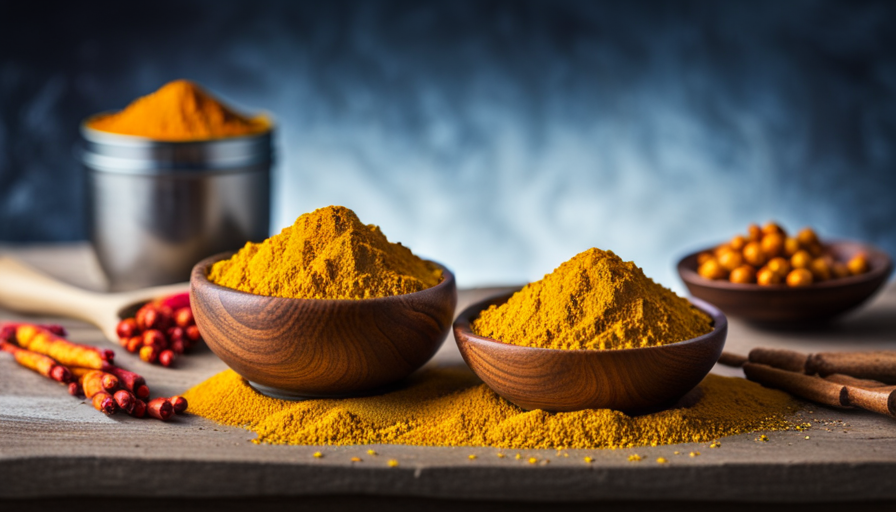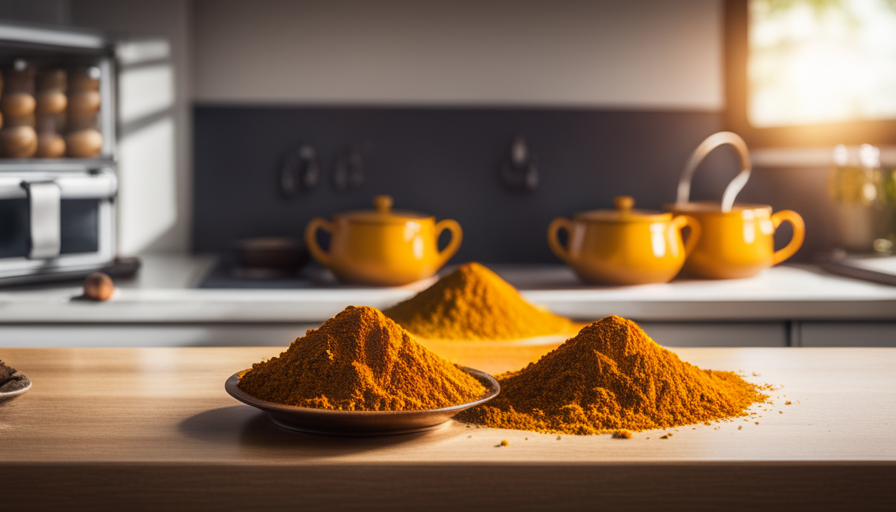Which natural remedy is more effective for reducing inflammation: turmeric or curcumin? Have you ever pondered this question?
Picture this: Sarah, a 40-year-old woman, has been struggling with chronic joint pain caused by inflammation. She’s been researching natural remedies and came across two popular options: turmeric and curcumin. Both have been praised for their anti-inflammatory properties, but she’s unsure which one to choose.
In this article, we will explore the origins and composition of turmeric and curcumin, delve into their anti-inflammatory benefits, and compare their effectiveness in clinical studies. Additionally, we will discuss bioavailability, potential side effects, and safety considerations.
By the end, Sarah will have a better understanding of whether turmeric or curcumin is the ideal choice for her inflammation. So, let’s dive in and uncover the truth behind these popular remedies.
Key Takeaways
- Turmeric and curcumin both have anti-inflammatory properties.
- Curcumin is the compound found within turmeric responsible for many of its health benefits.
- Turmeric and curcumin can effectively reduce inflammation in various conditions, such as rheumatoid arthritis and osteoarthritis.
- Combining turmeric and curcumin can enhance their individual anti-inflammatory properties and provide greater protection against inflammation-related damage.
The Origins and Composition of Turmeric and Curcumin
Turmeric and curcumin, both derived from the vibrant yellow turmeric root, have been hailed as powerful anti-inflammatory agents.
Turmeric originates from the Curcuma longa plant, primarily grown in India and other Southeast Asian countries. For centuries, it has been used in traditional Ayurvedic and Chinese medicine for its healing properties.
Curcumin, on the other hand, is a compound found within turmeric that is responsible for many of its health benefits.
Turmeric contains various active components, including curcuminoids, volatile oils, and polysaccharides. Curcuminoids, the most abundant group of compounds, are known for their potent antioxidant and anti-inflammatory effects. These compounds work by inhibiting various enzymes and pathways involved in inflammation, thereby reducing its severity.
Curcumin, the main curcuminoid, has been extensively studied for its anti-inflammatory properties. Research suggests that it can suppress the activity of pro-inflammatory molecules, such as cytokines and enzymes like cyclooxygenase-2 (COX-2). Additionally, curcumin has been found to modulate the expression of genes involved in inflammation, further contributing to its anti-inflammatory effects.
Understanding the anti-inflammatory properties of turmeric and curcumin is crucial in harnessing their potential benefits. By delving deeper into the mechanisms of action, we can gain insights on how these compounds can be utilized in the management of inflammation.
Understanding the Anti-Inflammatory Properties of Turmeric
To understand the anti-inflammatory properties of turmeric, you’ll be fascinated to learn that a study found that it can reduce the levels of a specific inflammatory marker by an impressive 32%. This highlights the potential of turmeric in combating inflammation within the body.
Beyond this, turmeric has also been shown to play a role in gut health, which is closely linked to inflammation. Studies have indicated that turmeric can help improve gut health by reducing inflammation in the gut lining and promoting the growth of beneficial bacteria. This is important because a healthy gut can contribute to overall well-being and help prevent chronic inflammation.
Furthermore, turmeric has been investigated for its impact on autoimmune diseases, which are characterized by an overactive immune response and chronic inflammation. Research suggests that turmeric may help modulate the immune system and reduce the inflammatory response associated with autoimmune conditions. While more studies are needed to fully understand the mechanisms behind turmeric’s effects on autoimmune diseases, the initial findings are promising.
In the next section, we will explore the benefits of curcumin in reducing inflammation, building upon the understanding of turmeric’s anti-inflammatory properties.
Exploring the Benefits of Curcumin in Reducing Inflammation
If you’re looking to reduce inflammation and improve your overall well-being, exploring the benefits of curcumin can be a game-changer for you. Curcumin, the active compound found in turmeric, has been studied extensively for its anti-inflammatory properties.
Many studies have shown that curcumin supplementation can effectively reduce inflammation in the body. One of the key benefits of curcumin supplementation is its potential to provide relief from inflammation without the side effects commonly associated with traditional anti-inflammatory medications. While medications like nonsteroidal anti-inflammatory drugs (NSAIDs) can be effective in reducing inflammation, they often come with a host of side effects, such as stomach ulcers, liver damage, and increased risk of cardiovascular events. Curcumin, on the other hand, has been found to be safe and well-tolerated, even at high doses.
In addition to its anti-inflammatory properties, curcumin has also been shown to have antioxidant, anticancer, and neuroprotective effects. It has the ability to scavenge free radicals and reduce oxidative stress, which can contribute to inflammation and various chronic diseases.
The benefits of curcumin supplementation in reducing inflammation are significant. Not only does it provide relief without the potential side effects of traditional anti-inflammatory medications, but it also offers additional health benefits.
Transitioning into the next section about bioavailability, let’s delve into how the body absorbs and utilizes turmeric and curcumin.
Bioavailability: How the Body Absorbs and Utilizes Turmeric and Curcumin
The body’s ability to absorb and utilize curcumin is like a well-oiled machine, efficiently processing and reaping the benefits of this powerful compound found in turmeric. However, there are some bioavailability challenges when it comes to curcumin.
Curcumin has low solubility in water and is rapidly metabolized and eliminated from the body. This means that when consumed alone, curcumin is not easily absorbed by the bloodstream and therefore its therapeutic effects may be limited.
To overcome these challenges, researchers have explored various methods to enhance the absorption of curcumin. One approach is to combine curcumin with certain compounds, such as piperine found in black pepper, which has been shown to significantly increase curcumin absorption. Another method is to formulate curcumin with lipids or nanoparticles, which can improve its solubility and stability, allowing for better absorption.
These advancements in enhancing curcumin absorption have paved the way for more effective utilization of this compound in reducing inflammation. Clinical studies have compared the effectiveness of turmeric and curcumin in reducing inflammation, shedding light on their respective benefits.
[Transition sentence to the subsequent section about comparing the effectiveness of turmeric and curcumin in clinical studies].Comparing the Effectiveness of Turmeric and Curcumin in Clinical Studies
Discover the incredible results of clinical studies that compare the effectiveness of turmeric and curcumin in reducing inflammation and see how they can revolutionize your health! Comparing the effectiveness of turmeric and curcumin in clinical trials is essential to determine which one is more beneficial for reducing inflammation.
Several studies have evaluated the efficacy of both turmeric and curcumin in reducing inflammation, and the results are promising. One study published in the journal Oncogene found that curcumin was effective in reducing inflammation in patients with rheumatoid arthritis.
Another study published in the journal Phytotherapy Research compared the effects of turmeric and curcumin in patients with osteoarthritis and found that both were effective in reducing pain and inflammation. A systematic review published in the Journal of Medicinal Food analyzed multiple studies and concluded that both turmeric and curcumin have anti-inflammatory properties. However, curcumin was found to be more effective in reducing inflammation markers in certain conditions, such as inflammatory bowel disease.
These findings suggest that both turmeric and curcumin can be beneficial in reducing inflammation. However, curcumin may have a slight edge in terms of effectiveness. It is important to note that more research is needed to fully understand the differences between turmeric and curcumin in reducing inflammation.
As we delve into the potential side effects and safety considerations of turmeric and curcumin, it is important to consider the effectiveness of these compounds in reducing inflammation.
Potential Side Effects and Safety Considerations of Turmeric and Curcumin
Explore the potential risks and precautions associated with using turmeric and curcumin to ensure you’re making informed decisions about your health. While turmeric and curcumin are generally considered safe when taken in appropriate doses, there are some potential side effects and safety considerations to be aware of.
Turmeric and curcumin have been reported to cause gastrointestinal issues such as stomach upset, diarrhea, and nausea in some individuals. It’s important to start with a low dose and gradually increase it to minimize these effects.
Additionally, turmeric and curcumin may interact with certain medications, such as blood thinners, and should be used with caution in individuals taking these medications.
Furthermore, some studies have suggested that turmeric and curcumin may have a blood-thinning effect, which could increase the risk of bleeding in individuals with bleeding disorders or those about to undergo surgery. It’s crucial to consult with a healthcare professional before using these supplements in such cases.
While turmeric and curcumin are generally safe, it’s important to be aware of the potential side effects and safety considerations. Consulting with a healthcare professional is recommended, especially if you have any underlying health conditions or are taking medications. Taking these precautions will help you make an informed decision about whether turmeric or curcumin is the best choice for you in managing inflammation.
Factors to Consider When Choosing Between Turmeric and Curcumin for Inflammation
Consider the factors that can impact your choice between turmeric and curcumin for managing inflammation. One important factor to consider is the bioavailability of curcumin compared to turmeric. Curcumin has been found to be 20 times more bioavailable than turmeric, maximizing its potential benefits. Bioavailability refers to the amount of a substance that is absorbed and utilized by the body. However, curcumin supplements that are formulated with specific delivery systems or combined with other ingredients can significantly improve its bioavailability.
Another factor to consider is the dosage. Turmeric contains only around 2-5% curcumin, so higher doses of turmeric may be required to achieve the same level of curcumin as a supplement. It is worth noting that turmeric contains other compounds that may have their own health benefits.
Personal preferences and convenience should also be taken into account. Some individuals may find it more convenient to incorporate turmeric into their cooking, while others may prefer the simplicity of taking a curcumin supplement.
When choosing between turmeric and curcumin for managing inflammation, factors such as bioavailability, dosage, and personal preferences should be considered. Transitioning into the subsequent section about combining turmeric and curcumin for enhanced anti-inflammatory effects, it is important to explore how these two substances can work synergistically to provide greater benefits.
Combining Turmeric and Curcumin for Enhanced Anti-Inflammatory Effects
To maximize the anti-inflammatory effects, you can combine turmeric and curcumin, creating a powerful duo that works synergistically to provide greater benefits. When used together, these two compounds have been found to enhance their individual anti-inflammatory properties, leading to a more potent effect on reducing inflammation in the body. Here are five ways in which combining turmeric and curcumin can enhance their anti-inflammatory effects:
-
Increased bioavailability: Curcumin, the active compound in turmeric, has low bioavailability on its own. However, when combined with turmeric, the absorption and bioavailability of curcumin are significantly improved, allowing for greater anti-inflammatory effects.
-
Targeting different pathways: Turmeric and curcumin work on different molecular targets and signaling pathways involved in inflammation. By combining them, you can target multiple pathways simultaneously, resulting in a more comprehensive anti-inflammatory response.
-
Synergistic antioxidant activity: Both turmeric and curcumin exhibit potent antioxidant properties, which can help reduce oxidative stress and inflammation. When combined, their antioxidant effects are enhanced, providing greater protection against inflammation-related damage.
-
Optimal dosage: Combining turmeric and curcumin allows for flexibility in dosage. You can adjust the amounts of each based on your specific needs, finding the optimal balance to achieve the desired anti-inflammatory effects.
-
Timing for maximum effect: Taking turmeric and curcumin together at the right time can further enhance their anti-inflammatory benefits. For example, consuming them with a meal that contains fat can improve their absorption and utilization by the body.
By exploring the synergistic benefits, optimal dosage, and timing of turmeric and curcumin, you can enhance their anti-inflammatory effects. However, there are also other natural remedies for inflammation to consider.
Other Natural Remedies for Inflammation to Consider
Looking for more ways to naturally soothe inflammation? Check out these alternative remedies that can provide relief.
In addition to turmeric and curcumin, there are several other natural remedies and alternative treatments that have been found to be effective in reducing inflammation.
One popular option is ginger, which has been used for centuries in traditional medicine to treat various ailments, including inflammation. Ginger contains compounds called gingerols, which’ve been shown to possess anti-inflammatory properties. Adding ginger to your diet or drinking ginger tea can help reduce inflammation.
Another natural remedy is omega-3 fatty acids, which’re found in fatty fish like salmon, mackerel, and sardines. Omega-3s’ve been shown to have anti-inflammatory effects and can help reduce symptoms of chronic inflammation. If you don’t consume enough omega-3s through your diet, you can also consider taking fish oil supplements.
Additionally, green tea has been praised for its numerous health benefits, including its anti-inflammatory properties. Green tea contains catechins, which’ve been shown to reduce inflammation in the body. Drinking green tea regularly can help alleviate inflammation.
While turmeric and curcumin are known for their anti-inflammatory effects, there are several other natural remedies and alternative treatments that can provide relief from inflammation. Incorporating these natural remedies into your lifestyle may help reduce inflammation and promote overall health and well-being.
Frequently Asked Questions
Can turmeric and curcumin be used interchangeably for reducing inflammation?
Yes, turmeric and curcumin can be used interchangeably for reducing inflammation. However, there may be potential differences in their effectiveness. Turmeric is a spice derived from the turmeric plant, while curcumin is a compound found in turmeric. Studies suggest that curcumin may have stronger anti-inflammatory properties due to its higher concentration. Nonetheless, both turmeric and curcumin have shown promising results in reducing inflammation and can be beneficial for overall health.
Are there any potential interactions or contraindications with turmeric or curcumin and certain medications?
There are potential drug interactions and contraindications with turmeric or curcumin and certain medications. It’s important to be aware of these interactions, especially if you’re taking medications for specific health conditions.
Some medications that may interact with turmeric or curcumin include blood thinners, antiplatelet drugs, and certain anti-inflammatory medications.
Additionally, the safety of long-term use of turmeric or curcumin for chronic inflammation is still being studied, so it’s important to consult with a healthcare professional before starting any new supplement regimen.
How long does it typically take for turmeric or curcumin to show noticeable anti-inflammatory effects?
It typically takes time for turmeric or curcumin to show noticeable anti-inflammatory effects. Research suggests that the duration may vary depending on several factors, such as the dosage, individual’s health condition, and the severity of inflammation.
Some studies have shown that regular use of turmeric or curcumin over a period of 4 to 8 weeks may help reduce chronic pain and inflammation. However, it’s important to consult with a healthcare professional for personalized advice and guidance.
Are there any specific dosage recommendations for turmeric or curcumin when used for inflammation?
When using turmeric or curcumin for inflammation, it’s important to consider specific dosage recommendations.
For turmeric, a typical dosage is 500-2,000 mg per day, while curcumin supplements usually contain 400-600 mg of curcuminoids.
It’s also crucial to prioritize the long-term safety of these supplements for chronic inflammation. Consulting with a healthcare professional is recommended to determine the appropriate dosage and to discuss any potential interactions or side effects.
Can turmeric or curcumin supplements be safely used long-term for chronic inflammation?
Turmeric and curcumin supplements can be safely used long-term for chronic inflammation. Studies have shown their effectiveness in reducing inflammation markers and improving symptoms. However, it’s important to consult with a healthcare professional before starting any long-term supplementation. They can provide personalized guidance and monitor for any potential side effects or interactions with other medications. It’s also worth noting that individual responses may vary, so it’s important to pay attention to your own body and adjust accordingly.
Conclusion
In conclusion, both turmeric and curcumin have shown promising anti-inflammatory properties in scientific studies. Turmeric, like a soothing balm, has been used for centuries in traditional medicine to alleviate inflammation. On the other hand, curcumin, like a powerful warrior, has been extensively studied for its potential in reducing inflammation.
While both have their merits, it’s important to consider factors such as bioavailability and individual preferences when choosing between the two. Additionally, combining turmeric and curcumin may offer enhanced anti-inflammatory effects.
Remember to consult with a healthcare professional before starting any new supplement regimen.










